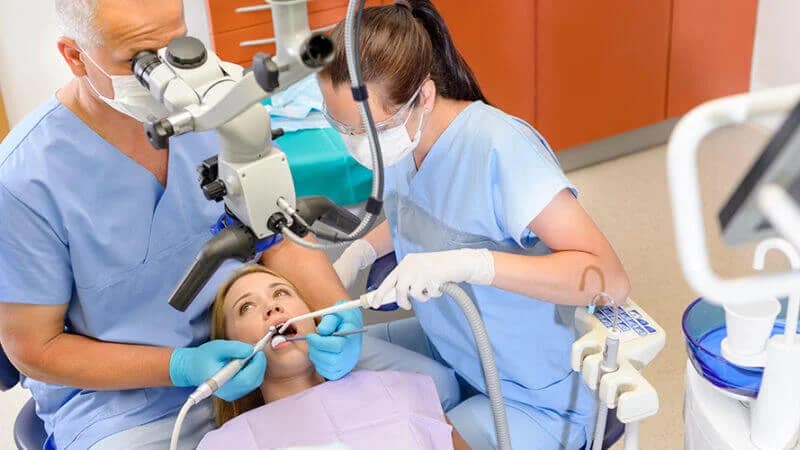What Is Oral Surgery?
The necessity of oral surgery comes up when there is pain and discomfort in the tooth that has gone beyond the pain threshold capacity.
Some of the reasons that raise the need for oral surgery are missing teeth, impacted teeth, broken teeth, tooth decay, jaw bone loss and many other complications that may unexpectedly damage your teeth internally.
Different types of oral surgeries are conducted for different teeth issues. The duration and the recovery phase are different for each surgery and all dental surgeries are performed by specialists who have expertise in various dental issues. Some of the specialists notably known in the dental world are oral and maxillofacial surgeons, periodontists and endodontists.
A few of the common oral surgeries performed by these specialists are tooth extraction, dental implants, sleep apnea surgery, periodontal surgery, dental bone grafts, cleft lip repair and corrective jaw surgery.
Common Reasons for Oral Surgery
People delay oral surgeries in the fear of pain. It is an agreeable point that the term “surgery” is not an easy option chosen but in the case of dental issues, they are the easiest way to reduce the trauma and resolve the dental issues that may cause major damage when ignored since the dental infections spread faster without hints until the damages are extensive.
Oral surgeries can be broken into two categories:
Maxillofacial Surgery – It is a Surgery that focuses on the head, face, jaw and neck. The hard and soft tissues are the main focus of this surgery.
Dentoalveolor Surgery – this surgery focuses on teeth and the supporting structures of teeth such as gums and roots.
Some of the common reasons that would require oral surgeries are:
Complex Tooth Extractions – Though tooth extractions can be commonly done as an in-office procedure itself, there are a few complicated tooth extractions when they need to be surgically removed if the tooth issue is below the gum line. For example, wisdom tooth extraction.
Implants Procedure – The implants have to be surgically placed on the jaw. It is very much necessary since the implants can restore the chewing ability of the teeth and also enhance the aesthetic appearance. Implants have proved to be a hassle-free surgical treatment that benefits more when compared to other dental procedures such as dentures and bridges.
The implant surgeries have variations too in them. Some may get only the extraction done at first and implants at later visits and some get extraction and surgery on the same day. The variations in the implant treatment depend on the condition of the teeth, the treatment plan and the different procedures involved in the surgery.
Need for Bone Augmentation – Few oral surgical procedures require a healthy jaw bone because some teeth restorations fuse with the jaw bone to give a stronger foundation to the restorations. In the absence of a strong jaw bone, a surgical procedure called bone augmentation is performed to make the jaw bone stronger.
Presence of Jaw Problem – Corrective jaw surgery is performed to resolve jaw bone-related issues such as joints problem that cause biting issues, speech issues, broken jaw or misalignment of the jaw.
What Is an Emergency Oral Surgery?
There are a few dental issues that can be delayed or treated the next day. The waiting period can make dental issues complicated and the damages may be irreparable. So when you rush to the dental clinic for dental issues that require immediate attention and need to be surgically treated they are known as emergency oral surgeries.
Though you may not know if the dental issue faced by you is an emergency or not, check on the causes mentioned below and rush to your nearest dental practitioner when you find the below causes:
Tooth Pain – If the tooth is infected or when there is severe pain in the tooth that is below tolerance then emergency oral surgery is necessary. According to clinical data, tooth pain is the first and most common cause that needs emergency oral surgery.
Impacted Tooth – Wisdom teeth are those teeth in our dental structure that do not get enough space to erupt out of the gums. This causes pain and discomfort in that area that usually shows up as swelling impacting the tooth activities. When the wisdom tooth pain is severe it is extracted with surgery.
Broken Tooth – An accident or a sports injury can cause the tooth to break. At times a dental procedure like a root canal can also lead to broken tooth issues. The broken tooth fragments are dangerous when left unattended. So it is removed immediately in emergency oral surgery.
Dental Implants Complications – If dental implants are loosened or have to be reinserted, emergency oral surgery is performed.
Temporomandibular Joint (TMJ) complications – These bones connect the jaws with the skull bone. If due for any reason the TMJ is broken or injured or dislocated then it has to be immediately operated on since the negligence and ignoring an emergency oral surgery may lead to severe complications in eating, speaking and even breathing.
Oral surgery complications – Some of the oral surgeries performed may not be completely successful and starts showing the failure symptoms such as excessive bleeding to correct the dental issue and stop the excessive bleeding, emergency oral surgery is a must.



